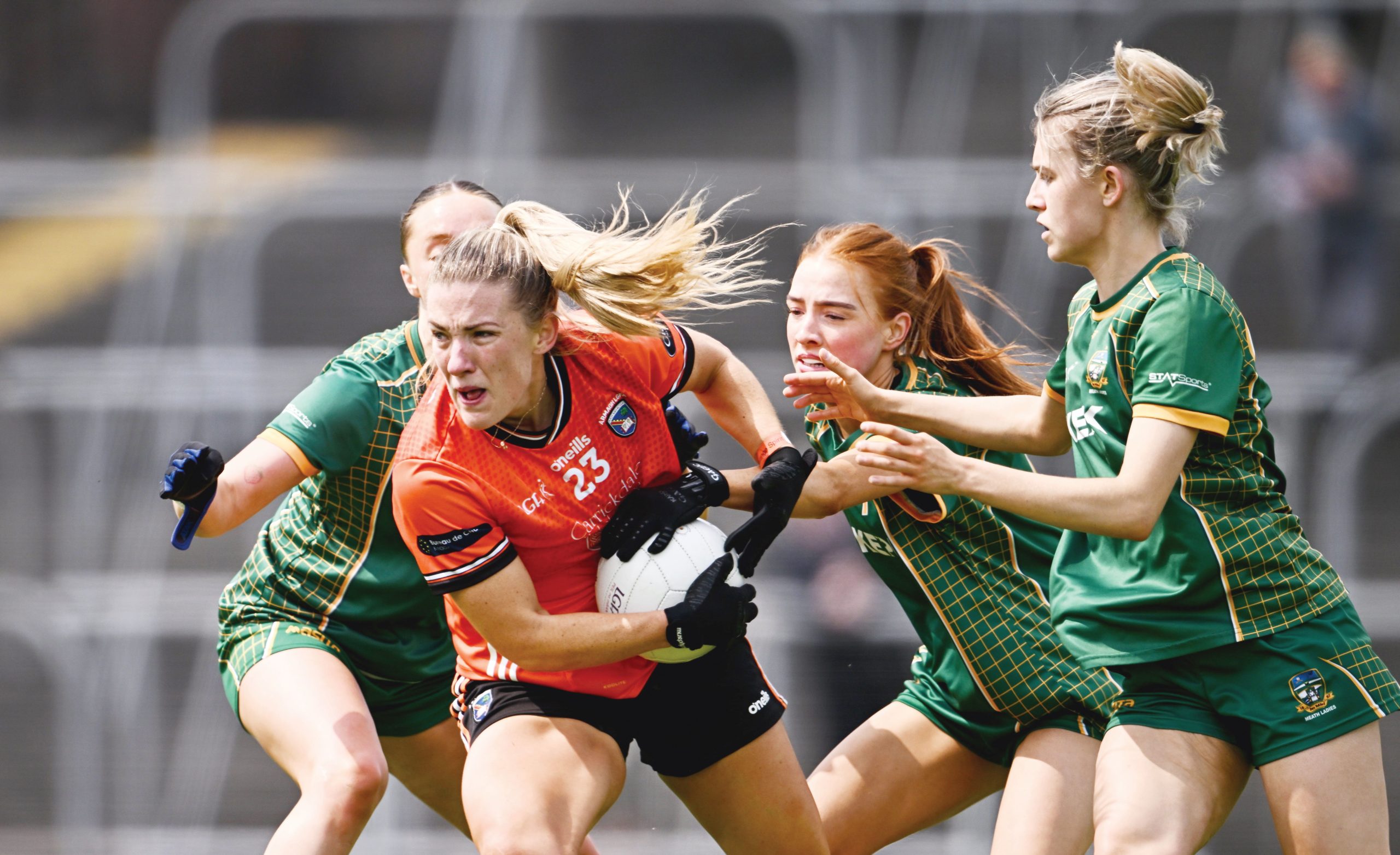Kelly Mallon has her say on whether the controversial non-contact rules in the LGFA should be changed
By Niall Gartland
THE reaction from the online community – that all-seeing, all-knowing behemoth – couldn’t have been more contrasting.
The All-Ireland Senior Camogie final between Galway and Cork? What a game, what a bloody game. The quality of the camogie was good surely but what about those thumping hits? Oh it was food for the soul.
The ladies equivalent between Dublin and Meath, however – ach it was poor. Sure Dublin hammered them, and what’s all this about players getting reprimanded for what looked like a perfectly timed tackle?
Media pundit Colm Parkinson for example was prompted to tweet, “It seems to me that you’re not allowed tackle at all in the women’s game.” Warming to the theme, he added, and pardon the French, “Vikki Wall says “you have to be ****ing joking me” as the ref gives her a free for nothing when she was away. Either change the rules or women’s football is going nowhere. Infuriating to watch.”
In a way, he’s not far wrong. There is a tackle in the women’s game, but it’s certainly been watered down. The official rule book states that “There shall be no deliberate bodily contact.” Further to that, “shouldering is not allowed.”
Giving a bit more info, the rule book further states that “A player holding the ball into her body cannot be legally dispossessed. Any attempt to do so will result in a free for her and her team.
“When making a tackle to dispossess a player of the ball, it must be timed when the player in possession is soloing, bouncing, kicking or passing the ball. The ball must be knocked from the opponents hand by flicking it with the open hand or hands.”
These rules, like ’em or lump ’em, have been in place since the LGFA’s foundation year of 1974. Maybe back then it wasn’t such a big deal, but ladies footballers, particularly at intercounty level, are physically stronger and more athletic than ever and it’s hard not to conclude that the guidelines are no longer fit for purpose.
Most pertinent to the conversation is the players themselves. What frustrates Armagh stalwart Kelly Mallon most of all is the flagrant inconsistency. Not only are the rules applied differently based on seemingly ad hoc factors, but she believes that even individual referees adopt a different approach from game-to-game.
“The main issue I have is a player, is the lack of consistency from referee-to-referee, and it’s also a waste of time doing your analysis on a referee, because he or she changes their approach completely from one game to the next.
“We used to spend so much time analysing referee trends, then when it came to our match, they didn’t actually blow for anything that we’d talked about, so it was essentially a waste of time.”
It’s understood that it’s highly unlikely that Central Council will consider any rule changes in advance of next year’s Congress, though the governing body does have the authority to make changes if presented with recommendations from a body within the Association. Mallon believes change is needed, citing this year’s highly watchable All-Ireland Senior Camogie final,though whether that happens any time soon is another matter.
“I do think change is needed because girls are obviously strong enough to take some contact. There’s no shouldering allowed either, which I think is silly to be honest. Changes were made in camogie to allow shoulder-to-shoulder contact and if you look at the camogie final, it was great. Don’t get me wrong, the referee maybe went a bit too far with the physicality of that one in particular, but it was still a brilliant game to watch. Everyone enjoyed the game as a spectacle because of it.”
She also believes that there’s a north v south element to the differing application of the rules.
“When the referee is decent, the game is fine as it is. It’s just that lack of consistency across the board. That’s the issue that most of the players have. Referees probably need more help as well.
“When we go down south, it’s a more physical game, referees seem to let more go. That’s just a personal opinion and to be fair all the All-Ireland winners have been from the south lately, so maybe they’re a bit further on in their development as well.”
While the protective measures are perhaps more than a touch antiquated, Kelly doesn’t necessarily believe that there’s an element of sexism underpinning it all. Instead, it seems that the LGFA are genuinely concerned about the impact on its juvenile members, though that’s something that could be factored into any future changes.
“I don’t think it’s that – I think it’s that a change to the rulebook would apply to every level. I have been involved in these conversations before and it seems like it’s about protecting the younger players more so than those playing at the elite level, but I would be favour in some sort of wording change. The rule says there ‘shall be no deliberate bodily contact’ and that ‘shouldering is not allowed’ and those two things happen, and depending on the referee, you could get someone whistle happy, and you could get someone who lets it go.
“Listen, it’s not the referees’ fault either, it is very hard to apply the rule book fairly as it stands.”
The men’s game has been subject to a root and branch review which saw a whole swathe of radical new measures introduced on a one-year basis in 2025, though it’s a safe bet that most, if not all of them, will be here for the long run.
Asked whether she’d like to see the LFGA follow suit, Kelly said: “I’d like to see some of them brought in – I think the three-up is a no brainer, and the solo and go would be handy to implement.
“Another thing that’s come into the ladies game a lot is cynical fouling. I’d like that to be dealt with properly. Then there’s really simple things like the vanishing foam so you’re not going to cross the marker in a free-kick.
“There’s the two-pointers as well – obviously we’d only have a select number of players who’d be able to do that in the ladies’ game, but the equivalent would be a 30-metre arc and that could possibly work, but I think if they introduced the three-up and solo and go, that would definitely help the flow of the game.”
On that note, the Armagh footballer says that the game has become more cynical even in recent years, but she points the finger of blame firmly at the rules.
“Teams can get away with things – there’s three ticks and then there’s a yellow, so you can rotate the fouler, and Dublin are brilliant at that.”
She also believes that the rules surrounding the hooter system in the ladies’ game needs to be tightened up. Again, the problem is inconsistency.
“I feel the LGFA need to change their ruling on it, so that it’s the same as the men’s game. It’s another aspect of the game that is inconsistent – there’s no hooter system in league games and even some All-Ireland group games.
“Some referees interpret the rules differently as well, and I’ve seen this first hand. In 2022 Ulster final you’re standing over an equalising free kick and the ref counted down the time left – 10, 9, 8, 7 etc, even though the rule is that if you win the free before the hooter goes you can take the free as long as it goes directly over the bar or into the net.
“We played 39 minutes in the second half of a league game this season on even though there were no major injuries or delays.
“Teams train all year to manage end of half scenarios and that all goes out the window because of no consistency in the implementation of the rules and clock system.”
Ultimately, however, Mallon isn’t really convinced that change is around the corner. It’s been a topic of debate for quite some time and that’s how it’s remained – a mere talking point.
“I haven’t heard of anything happening, no proposals came through to any of us anyway. The contact one has been talked about every other season. That would be the obvious one that needs to be amended in some shape or form. But no is the short answer, there’s no whispers in the background or anything like that.”
Receive quality journalism wherever you are, on any device. Keep up to date from the comfort of your own home with a digital subscription.
Any time | Any place | Anywhere













